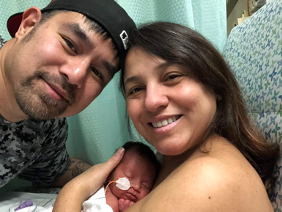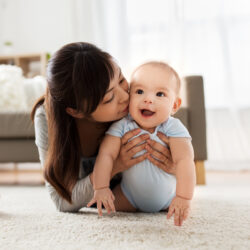After 4 IUI failures and multiple miscarriages, Diane wondered if having a baby at her advanced age was in the cards
 When Diane Quindoy and her husband, Ian, began trying to conceive, they hoped pregnancy would come naturally. Unfortunately, their journey took much longer than they had expected. At age 40, Diane began intrauterine insemination (IUI). After three years and four negative attempts, she knew it was time to try something new.
When Diane Quindoy and her husband, Ian, began trying to conceive, they hoped pregnancy would come naturally. Unfortunately, their journey took much longer than they had expected. At age 40, Diane began intrauterine insemination (IUI). After three years and four negative attempts, she knew it was time to try something new.
Diane’s OB-GYN suggested she visit Reproductive Science Center of the San Francisco Bay Area to seek out expert advice on additional fertility treatments that might have offered a better chance of pregnancy for the couple. Diane quickly reached out and came under the care of Dr. Mary Hinckley. After meeting with Diane and Ian and running the proper tests, Dr. Hinckley suggested donor egg IVF.
“When my OB-GYN suggested RSC Bay Area, my husband and I did some research and decided to give them a shot,” said Diane. “I’m glad we did. I always felt supported and cared about, which I did not feel at my previous clinic.”

Breaking Barriers, Building Families
Since 1983, we have pioneered fertility treatment for every kind of family. We want to help you achieve your dream of having a baby.
Request appointmentPreparing for egg donation
Using a donor egg for IVF (in vitro fertilization) is often suggested for women in the following situations: those who are over 40; who have high follicle stimulating hormone (FSH) levels or low anti-Müllerian hormone (AMH); and those with a low ovarian response in prior IVF cycles. Women may also benefit from this fertility treatment if they have a history of radiation and/or chemotherapy, premature ovarian failure, if they have been unable to achieve a pregnancy after multiple IVF cycles, or if both ovaries have been surgically removed.
Related Reading: Older Moms, Higher Pregnancy Risks, But Still Much Success!
The egg donation process with IVF begins with the recipients choosing their donor. This can be someone they know or someone in the donor registry. The recipient mother then prepares for the IVF cycle, which will include medication and the transfer of the embryo(s). The cycle takes approximately five weeks to complete from start to finish. Fourteen days later a blood pregnancy test is performed.
Overcoming the crushing loss of recurrent miscarriages
Diane’s first donor egg transfer resulted in a positive pregnancy. She and Ian were ecstatic that they would finally be able to add to their family. Joy turned to sorrow when the pregnancy was lost after six weeks.
The couple continued donor egg IVF treatments, experiencing two more losses before the eight-week mark. Although the miscarriages were devastating, Diane and Ian never gave up hope that one day they would welcome a beautiful, healthy baby into their life.
Related Reading: Emotional Concerns Are the Greatest Barrier to Infertility Treatment
Cautious optimism after the 5th egg donation with IVF
When Diane became pregnant with the fifth donor egg embryo transfer, she was cautiously optimistic. After her previous losses she didn’t want to get her hopes too high and she didn’t want to share the news too early, in fear she would experience another miscarriage.
“I was afraid to get too attached to the baby in case we lost this one, too,” says Diane. “I really believe that infertility and recurrent losses is traumatic and can cause PTSD-like symptoms.”
Problem pregnancy with gestational diabetes & hyperemesis gravidarum
But Dr. Hinckley was continuously positive and encouraging, and right. At age 46 through egg donation, Diane gave birth to her son, Mateo. The pregnancy wasn’t easy. She had gestational diabetes and was insulin dependent. Diane also suffered from hyperemesis gravidarum that caused severe nausea throughout the pregnancy.
Facing PPROM and a C-section
At 34 weeks preterm premature rupture of membranes (PPROM) caused Diane to deliver Mateo via emergency C-section. He weighed five pounds and stayed in the Special Care Nursery for a month. Diane and Ian spent every available moment at the hospital and visited Mateo every chance they had.
Although the journey to conception and the pregnancy were difficult, to say the least, Diane does not regret a thing. “Despite all these obstacles, when I see our son smile or hear him laugh, I realize it was all worth it,” says Diane. “He is the light of our lives and such a joy!”
Words to the wise on egg donation
Diane knows that making the decision to use donor eggs is not an easy one, nor is it for everyone. Before making the choice to pursue this form of fertility treatment, she struggled with the idea the baby wouldn’t be “hers” and worried she might not be able to bond with him.
“What I would like other women in this position to know is the baby is definitely yours,” says Diane. “You nurtured and cared for the baby inside of your body. I do not regret our decision one bit and I had absolutely no problem bonding with our son, nor did I have any thoughts of him not being mine after he was born.”
Diane also wants couples trying to conceive to know that egg donation with IVF is not a sure thing. “I was naïve when I started on this path and thought I’d go through one cycle and have a baby easily,” she says. “They were excellent, young eggs from a healthy 24-year-old – what problems could we have?”
Diane’s excitement tuned out Dr. Hinckley’s caution
Diane had soon realized the journey would not be as easy as she had thought. She knew Dr. Hinckley had explained this in the beginning, but in her excitement and belief that the first cycle would work she didn’t hear the doctor’s caution.
There were several times along the way Diane thought about giving up, that having a baby at her age was just not in the cards. “I’m so glad I didn’t,” says Diane. “And I’m so glad we have Mateo in our lives now!”